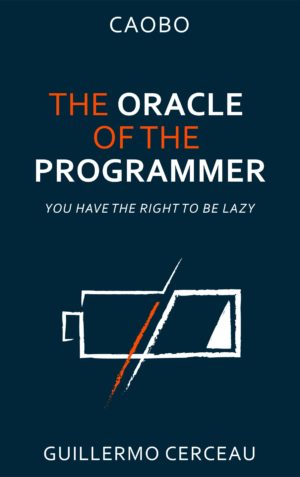The Oracle of the Programmer
€ 2,99
The Oracle of the Programmer is a practical book to find solutions to problems of coding and technical design. It presents a new image of the programmer as an artisan and offers thinking paths a coder can explore when he or she hits a seemingly insurmountable issue.
The book was written about 20 years ago to help young programmers with writer’s block. In those days, our colleagues were more or less self-taught and very young.
Even if programming education has evolved a lot since then, and there are a lot more tools available to assist coders and support staff, the community still suffers from many of the same issues of the early days. Coding is no longer an exclusive skill for programmers, but it’s a competence picked up by designers, scientists, high school students, and their teachers. Many technicians of all kind had to learn to code in order to work with ever more evolved and self-thinking machines.
This book aims to offer a helping hand to our growing community and provide inspiration, reason, and warmth when there is a lacking thereof.
Other formats and stores
(libro de bolsillo)
Guillermo Cerceau
escritor, consultor
Guillermo Cerceau (Argentina, 1957) es consultor especializado en nuevas tecnologías. Ha trabajado durante veinte años en el mundo empresarial, primero como consultor independiente y luego, en KPMG, durante casi 11 años, donde alcanzó el puesto de CIO para Venezuela. Actualmente investiga ciudades, migraciones, cambio climático y tecnologías avanzadas como AI, VR, AR y las llamadas “Smart Cities”.
writer, consultant
Guillermo Cerceau (Argentina, 1957) is a consultant specialized in new technologies. He has worked for twenty years in the corporate world, first as an independent consultant and then, at KPMG, for almost 11 years, where he reached the position of CIO for Venezuela. Currently researching cities, migrations, climate change, and advanced technologies like AI, VR, AR and so-called “Smart Cities”.
Extract
0 1 0 1 1. Style and programming
Get acquainted with the canon of programming norms very well; the manuals generally establish guidelines for the name of variables and procedures, indentation mode, and other stylistic aspects. Memorize them and then work to forget them.
Explanation
Is there anything such as ‘pure detonation’? Is that nightmare, disguised as a dream of the logicians of the turn of the century, and the few logical positivists still active today, true? Was it ever true? Of course not. Any mathematician knows how the shape of symbols influences their ability to think of a theorem or solution to an equation. Among other reasons, it was his superior symbolism that gave Leibnitz preeminence over Newton in integral calculus, even though both men discovered (or invented) this branch of mathematics almost simultaneously. In some ways, the ∫ of the Leibnizian integral rule and the symbology of his derivatives were more favorable to mathematicians than the fluxions of Newton.
Definitely yes, the elements of formal languages contain connotations. A specific ‘style’ manifests itself in the source code of the programmers.
How could the result not reflect these non-explicit elements of a program? How can we manage that ‘intangible’ part of an intangible thing that is software? What methodology could put an order in that ‘vertical and solitary dimension of thought‘? In the same way source code is text (and that’s what it is, in all its rights), it’s subject to the unconscious laws that govern the production of any text as well.
The final result, the program we aimed for, doesn’t depend entirely on these denotative and stylistic elements if it did they would be unpredictable and enigmatic artifacts: they would be works of art. But it would be a significant error of appreciation to assume that this aspect of programming has nothing to do with the obtained result with the administration of programming projects, and with the so-called ‘software crisis’, which as we have already said, doesn’t only end with each new methodology that announces his death, but it also presents us with new fronts.
Comments
Donald Knuth makes the following statement, in his book Literate Programing.
“Programming can be considered as the process of creating literary works, intended to be read. The literature of the ‘program genre’ is to be executed by machines, but that is not its primary purpose. A computer program that is beautiful, useful, and profitable, should be able to be read by human beings.”







